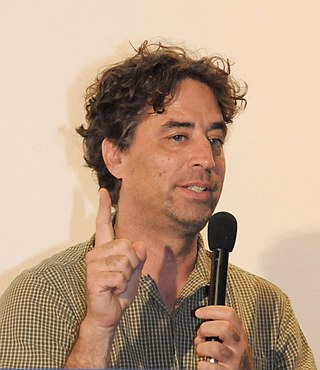
Globalization, or globalisation, is the process of interaction and integration among people, companies, and governments worldwide. The term globalization first appeared in the early 20th century, developed its current meaning some time in the second half of the 20th century, and came into popular use in the 1990s to describe the unprecedented international connectivity of the post-Cold War world. Its origins can be traced back to 18th and 19th centuries due to advances in transportation and communications technology. This increase in global interactions has caused a growth in international trade and the exchange of ideas, beliefs, and culture. Globalization is primarily an economic process of interaction and integration that is associated with social and cultural aspects. However, disputes and international diplomacy are also large parts of the history of globalization, and of modern globalization.

Antonio "Toni" Negri is an Italian Spinozistic-Marxist sociologist and political philosopher, best known for his co-authorship of Empire and secondarily for his work on Spinoza. Born in Padua, he became a political philosophy professor in his hometown university. Negri founded the Potere Operaio group in 1969 and was a leading member of Autonomia Operaia. As one of the most popular theorists of Autonomism, he has published hugely influential books urging "revolutionary consciousness".

Michael Hardt is an American political philosopher and literary theorist. Hardt is best known for his book Empire, which was co-written with Antonio Negri.
Cosmopolitanism is the idea that all human beings are members of a single community. Its adherents are known as cosmopolitan or cosmopolite. Cosmopolitanism is both prescriptive and aspirational, believing humans can and should be "world citizens" in a "universal community". The idea encompasses different dimensions and avenues of community, such as promoting universal moral standards, establishing global political structures, or developing a platform for mutual cultural expression and tolerance.
The term new social movements (NSMs) is a theory of social movements that attempts to explain the plethora of new movements that have come up in various western societies roughly since the mid-1960s which are claimed to depart significantly from the conventional social movement paradigm.
Democratic globalization is a social movement towards an institutional system of global democracy. One of its proponents is the British political thinker David Held. In the last decade, Held published a dozen books regarding the spread of democracy from territorially defined nation states to a system of global governance that encapsulates the entire world. For some, democratic mundialisation is a variant of democratic globalisation stressing the need for the direct election of world leaders and members of global institutions by citizens worldwide; for others, it is just another name for democratic globalisation.

Empire is a book by post-Marxist philosophers Michael Hardt and Antonio Negri. Written in the mid-1990s, it was published in 2000 and quickly sold beyond its expectations as an academic work.
Multitude is a term for a group of people who cannot be classed under any other distinct category, except for their shared fact of existence. Though its use dates back to antiquity, the term first entered into the lexicon of political philosophy when it was used by figures like Machiavelli, Hobbes, and most notably, Spinoza. The multitude is a concept of a population that has not entered into a social contract with a sovereign political body, such that individuals retain the capacity for political self-determination. A multitude typically is classified as a quantity exceeding 100. For Hobbes the multitude was a rabble that needed to enact a social contract with a monarch, thus turning them from a multitude into a people. For Machiavelli and Spinoza both, the role of the multitude vacillates between admiration and contempt. Recently the term has returned to prominence as a new model of resistance against global systems of power as described by political theorists Michael Hardt and Antonio Negri in their international best-seller Empire (2000) and expanded upon in their Multitude: War and Democracy in the Age of Empire (2004). Other theorists recently began to use the term include political thinkers associated with autonomist Marxism and its sequelae, including Sylvère Lotringer, Paolo Virno, and thinkers connected with the eponymous review Multitudes.

Autonomism, also known as autonomist Marxism is an anti-capitalist left-wing political and social movement and theory. As a theoretical system, it first emerged in Italy in the 1960s from workerism. Later, post-Marxist and anarchist tendencies became significant after influence from the Situationists, the failure of Italian far-left movements in the 1970s, and the emergence of a number of important theorists including Antonio Negri, who had contributed to the 1969 founding of Potere Operaio as well as Mario Tronti, Paolo Virno and Franco "Bifo" Berardi.
The Global Scenario Group (GSG) was an international, interdisciplinary body convened in 1995 by the Tellus Institute and the Stockholm Environment Institute (SEI) to develop scenarios for world development in the twenty-first century. Further development of the Great Transition scenarios has been carried on by the Great Transition Initiative (GTI).
The planetary phase of civilization is a term created by the Global Scenario Group (GSG) to describe the contemporary era in which increasing global interdependence and risks are binding the world into a unitary socio-ecological system. Characteristics of this phase include economic globalization, biospheric destabilization, mass migration, new global institutions, the Internet, new forms of transboundary conflict, and shifts in culture and consciousness.

The Tellus Institute is an American non-profit organization established in 1976 with the aim of bringing scientific rigor and systemic vision to critical environmental and social issues. Tellus has conducted thousands of projects throughout the world, and now focuses on the global future and how to shape it.

Paul Raskin is the founding President of the Tellus Institute, which has conducted over 3,500 research and policy projects throughout the world on environmental issues, resource planning, scenario analysis, and sustainable development. His research and writing has centered on propagating the Great Transition. Raskin has served as a lead author on a number of high-profile international reports, including the U.S. National Academy of Science's Board on Sustainability, the Millennium Ecosystem Assessment, the United Nations Environment Programme's Global Environment Outlook, the Earth Charter, and the Intergovernmental Panel on Climate Change (IPCC) Third Assessment Report.
Eco-nationalism is a synthesis of nationalism and green politics. Eco-nationalists may be from many points across the left–right political spectrum, but all are bound to the idea that the nation-state and its citizens have a special duty to protect the environment of their country.
Great Transition is used by the Great Transition Initiative and its predecessor, the Global Scenario Group (GSG), to describe a vision of a just and sustainable global future. The term was originally coined by Kenneth E. Boulding in The Meaning of the 20th Century – The Great Transition (1964) and describes the shift from pre-modern to post-modern culture, and the four possible courses of action that these organizations believe will allow humanity to successfully manage the Great Transition.
Prefigurative politics are the modes of organization and social relationships that strive to reflect the future society being sought by the group. According to Carl Boggs, who coined the term, the desire is to embody "within the ongoing political practice of a movement [...] those forms of social relations, decision-making, culture, and human experience that are the ultimate goal". Besides this definition, Leach also gave light to the definition of the concept stating that the term "refers to a political orientation based on the premise that the ends a social movement achieves are fundamentally shaped by the means it employs, and that movement should therefore do their best to choose means that embody or prefigure the kind of society they want to bring about". Prefigurativism is the attempt to enact prefigurative politics.
Robert W. Kates was an American geographer and independent scholar in Trenton, Maine, and University Professor (Emeritus) at Brown University.

The New Economy Coalition (NEC) is an American nonprofit organization based in Boston, Massachusetts, formerly known as the New Economics Institute. It is a network of over 200 organizations based in the US and Canada working for "a future where people, communities, and ecosystems thrive...where capital is a tool of the people, not the other way around." as part of what it describes as the New Economy movement.

The New Economy Movement in the United States is a group of organizations that are attempting to restructure the current economic system. The movement prioritizes human well-being over economic growth. Its primary goal is to localize the economy in an attempt to spread wealth and promote sustainable business practices. The New Economy movement challenges both neoclassical and Keynesian economics to include theories of ecological economics, solidarity economy, commons, degrowth, systems thinking and Buddhist economics. The movement promotes more public ownership of the economy through organizational structures such as cooperatives, and state-owned banks. The goal of these changes is to remove or alleviate harmful environmental and social impacts of capitalism through alternative economic as well as political practices. A principal leader of the movement is the political economist and activist Gar Alperowitz, who, with others, promote the democratizing ownership of businesses and the economy as a means to achieve a sustainable, fair, and equal society.
Cosmopolitan localism or Cosmolocalism is a social innovation approach to community development that seeks to link local and global communities through resilient infrastructures that bring production and consumption closer together, building on distributed systems. The concept of cosmopolitan localism was pioneered by Wolfgang Sachs, a scholar in the field of environment, development, and globalization. Sachs is known as one of the many followers of Ivan Illich and his work has influenced the green and ecological movements. Contrary to glocalisation, cosmolocalism moves from locality to universality, acknowledging the local as the locus of social co-existence and emphasizing the potential of global networking beyond capitalist market rules.








